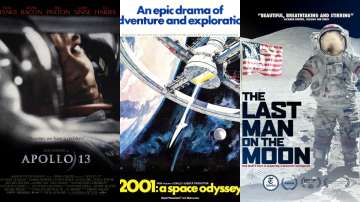Apollo 13 to 2001- A Space Odyssey: Films based on Lunar Mission
50 years after Apollo 11, these comedies, dramas, and documentaries explain one of mankind’s greatest feats. Know all the films based on lunar mission.

There are many stories to be told about the moon landing and about the decades before it, which gave people the idea to go and then made them keep trying, even in difficult and dangerous conditions. Here are nine films that help fill in those blanks and are well worth watching even if you’re not a space superfan.
1. A Trip to the Moon
This film isn’t about the moon landing, it came out in 1902, decades before NASA was founded in the late 50s. But Georges Melies’ seminal film was a pioneering work of its own. It’s considered one of the earliest science fiction movies, inspired partly by stories from writers like Jules Verne.
A Trip to the Moon is about a group of space explorers who travel to the moon, encounter a tribe of strange beings, capture one, and return to Earth. Melies himself played the crew’s leader, Professor Barbenfouillis.
2. Apollo 11
Apollo 11 directed by Todd Douglas Miller, harnesses these visuals to powerfully retell the story of man’s first trip to the moon. But Miller’s film does a lot more than just retread familiar history. Using never-before-seen footage and sound from the mission that has been meticulously scanned and restored, Apollo 11 moves from launch to safe return in a way that makes you feel as if you’re living through it.
3. The Dish
The Dish was Australia’s top-grossing film in 2000, and no wonder: It told a slightly fictionalized version of a true story, in which an Australian observatory played a key role in making sure the world could watch humankind’s first steps on the moon in 1969. During the Apollo 11 mission, NASA worked with Australian technicians to transmit communication and video signals back to Earth and the radio telescope they ended up using was in the middle of a sheep farm.
4. First Man
First Man by director Chazelle and screenwriter Josh Singer is less concerned with delivering a triumphalist portrayal of the moon landing than with painting a portrait of astronaut Neil Armstrong as he saw himself.
Based on Armstrong’s authorised biography, First Man presents a historic moment through the lens of an intimate personal experience, reminding us that the events that appear triumphant in history’s rearview mirror often come at the expense of pain and great personal sacrifice shouldered by real people.
5. The Last Man on the Moon
The Last Man on the Moon also helps to show how American attention started to veer away from the space race and toward other matters, and the effect that had on the astronauts who’d lived and worked through the period. Cernan, who died in 2017, is our guide, showing us why the missions mattered so much at the time not just to the astronauts involved in them, but also to the American public.
6. 2001: A Space Odyssey
2001: A Space Odyssey is an iconic 1968 science fiction classic, starring Keir Dullea and Gary Lockwood and directed by Stanley Kubrick. Following the discovery of a black monolith on the moon that emits a strange radio signal, an expedition travels to Jupiter including HAL 9000, the ship's advanced computer. After “Hal” begins acting in ways that jeopardize the crew's safety, Dr. David Bowman disables his decision-making functions. Once he does, he makes an alarming discovery: the mission's real objective was to investigate the radio signal sent from the moon to Jupiter.